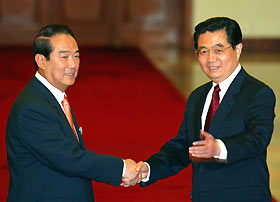|
Hu, Soong join hands for Straits peace
By Xing Zhigang (China Daily)
Updated: 2005-05-13 00:23
The Communist Party of China (CPC) and Taiwan opposition People First Party (PFP) yesterday reached wide-ranging consensus on cross-Straits dialogue, ending the state of hostility and building up a peace framework.
 |
| President Hu Jintao[R] shakes hands with Taiwan People First Party Chairman James Soong as they meet at the Great Hall of People in Beijing May 12, 2005. [newsphoto] |
The six-point consensus was included in a joint communique issued after an hour-long formal talk between CPC chief Hu Jintao and visiting PFP Chairman James Soong in the Great Hall of the People, the first in the history of both parties.
"The peaceful and stable development of cross-Straits relations requires both sides to conduct dialogue on an equal footing and to expand their consensus while putting differences aside," Hu said.
Both Hu and Soong's parties agree that cross-Straits peace talks should be conducted on the basis of the "1992 consensus," which highlights the one-China principle and shelves discrepancies concerning specific political connotations of the one-China.
Two sides, one China
To facilitate the resumption of cross-Straits talks and end the political stalemate, the communique proposes a new formula of "two sides, one China" to define cross-Straits relations.
But whether the new formulation will work depends on Taiwan leader Chen Shui-bian, who has denied the existence of the "1992 consensus."
"Both sides should bravely abandon outdated mentality and selfish motives against the interests of the Chinese and handle problems from a perspective that does good to the reality and future of the Chinese nation," Hu told Soong and his 50-member delegation.
The CPC and PFP firmly oppose any activities aiming at formal "independence" of the island and "constitutional changes through referendum," the communique said.
The proposal for "Taiwan independence" has disrupted the development of normal co-operative and mutually beneficial relations across the Straits, and severely sabotaged security and stability in the Straits as well as the Asia-Pacific region, it said.
The two parties also expect Taiwan authorities to earnestly honour the promise of "five no's" and live up to the commitment of not seeking "de jure Taiwan independence" through "constitutional" changes, according to the joint statement.
The call was apparently aimed at pressuring Chen Shui-bian to honour his pledges not to change cross-Straits status quo during a 10-point consensus he signed with Soong on February 24.
"Cross-Straits military conflicts can be effectively avoided so long as there is no possibility that Taiwan moves toward 'Taiwan independence'," the communique says.
Such an assurance indicates that non-peaceful means will not be employed if Chen of the ruling pro-"independence" Democratic Progressive Party (DPP) drops its secessionist timetable to write a new "constitution" for the island in 2006 and put it into effect in 2008, when Beijing holds the Olympic Games.
In the communique, the CPC and PFP also vow to join efforts to promote overall economic, trade and personnel exchanges across the Straits on the basis of mutual benefit and win-win co-operation.
The communique covers a series of topics such as the realization of two-way direct cross-Straits flights by 2006, increasing sales of Taiwanese farm products on the mainland and promoting co-operation in banking, insurance and other service sectors.
"We hope Taiwan authorities will sincerely adopt practical measures to facilitate the early realization of direct, two-way and comprehensive 'three links' across the Taiwan Straits," Hu said.
The mainland has promised to further simplify exit and entry procedures of Taiwan compatriots, apply the same rates of charges and fees on Taiwan students studying on the mainland as those on mainland students, and applying flexible employment policies on Taiwan compatriots seeking jobs on the mainland.
In a later press conference, Soong said the consensus in the communique has been a further show of goodwill by the mainland side toward the Taiwan people and reflects common aspirations by people in both the mainland and Taiwan for peace, stability and development in cross-Straits relations.
"The PFP will not hesitate in working together with the KMT to supervise the authorities and to defend the fundamental interests of the Taiwanese," Soong said.
(China Daily 05/13/2005 page1)
|